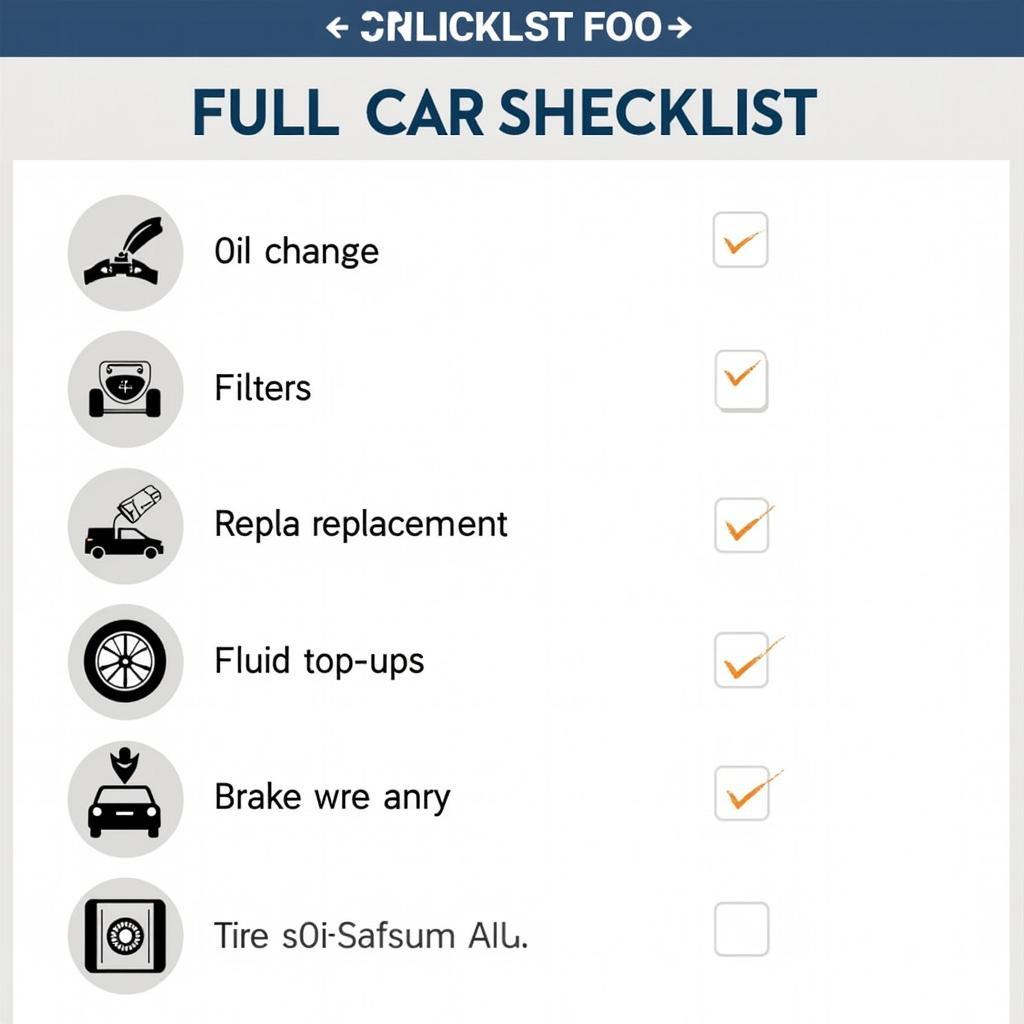When it comes to car maintenance, a “full car service” might seem like the holy grail, promising to keep your vehicle in tip-top shape. But what does a full car service actually include, and is it really necessary for every car owner? This comprehensive guide will delve into the ins and outs of a full car service, providing you with all the information you need to make informed decisions about your vehicle’s upkeep.
Understanding the Importance of a Full Car Service
A full car service goes beyond your standard oil change. It’s a thorough inspection and maintenance procedure that aims to address potential issues before they escalate into major problems. Think of it as a health check-up for your car, ensuring all its vital components are working in harmony.
“Regular full car servicing is the key to prolonging your vehicle’s lifespan,” says John Miller, a seasoned automotive expert with over 20 years of experience. “It’s about identifying minor issues early on, saving you from costly repairs and unexpected breakdowns in the long run.”
What Does a Full Car Service Typically Include?
While the exact inclusions may vary slightly depending on the garage and your car’s make and model, a full car service generally covers the following:
- Engine Oil and Filter Change: This is the cornerstone of any car service, ensuring smooth engine operation and preventing premature wear.
- Air Filter Replacement: A clean air filter is crucial for optimal engine performance and fuel efficiency.
- Spark Plug Inspection/Replacement: Worn-out spark plugs can lead to reduced fuel economy and engine misfires.
- Fluid Level Checks and Top-Ups: This includes brake fluid, coolant, power steering fluid, windshield washer fluid, and transmission fluid (if applicable).
- Brake Inspection: Your brakes are paramount for safety, and a full service will include checking the pads, discs, and calipers for wear and tear.
- Tire Pressure and Condition Check: Maintaining proper tire pressure is essential for safe handling and fuel efficiency. The mechanic will also inspect your tires for signs of damage or uneven wear.
- Battery Test: Your car’s battery powers everything from the ignition to the lights. A battery test will assess its health and charge level.
- Lights Check: All exterior and interior lights will be checked to ensure they are functioning correctly.
- Steering and Suspension Check: This involves inspecting the steering components and suspension system for any signs of wear or play.
- Exhaust System Check: The mechanic will look for any leaks, cracks, or excessive noise in the exhaust system.
How Often Should You Get a Full Car Service?
As a general rule of thumb, it’s recommended to get a full car service annually or every 12,000 miles, whichever comes first. However, it’s essential to consult your car’s owner’s manual for specific service intervals recommended by the manufacturer.
The Benefits of Regular Full Car Servicing:
- Increased Safety: Regular maintenance ensures all safety-critical components are in optimal condition, reducing the risk of accidents.
- Improved Performance and Fuel Efficiency: A well-maintained engine runs smoother, delivers better fuel economy, and emits fewer pollutants.
- Extended Vehicle Lifespan: By addressing minor issues early on, you can significantly prolong the lifespan of your vehicle.
- Higher Resale Value: A car with a well-documented service history is more attractive to potential buyers, commanding a higher resale value.
- Peace of Mind: Knowing your car is in top condition gives you peace of mind and eliminates the stress of unexpected breakdowns.
Full Car Service vs. Interim Car Service
You might also come across the term “interim car service.” This is a less comprehensive service that typically focuses on essential maintenance tasks like oil and filter changes, fluid top-ups, and visual inspections. Interim services are often recommended every 6 months or 6,000 miles, bridging the gap between full car services.
For a more in-depth look at interim car services, you can refer to our article: what is done in an interim car service.
Choosing the Right Garage for Your Full Car Service
When entrusting your vehicle to a garage for a full car service, it’s crucial to choose a reputable and reliable establishment. Here are some factors to consider:
- Certifications and Accreditations: Look for garages that are certified by reputable organizations like the National Institute for Automotive Service Excellence (ASE).
- Experience and Expertise: Choose a garage with a team of experienced mechanics who are familiar with your car’s make and model.
- Customer Reviews and Testimonials: Online reviews and testimonials can provide valuable insights into the garage’s reputation and customer satisfaction levels.
- Transparency and Communication: A trustworthy garage will communicate clearly about the services included, the estimated cost, and any findings during the inspection.
Conclusion
A full car service is an investment in your vehicle’s longevity, performance, and safety. By understanding what’s included and choosing a reputable garage, you can ensure your car stays in top condition for miles to come. Regular maintenance is not just about preventing breakdowns but about maximizing your driving experience and enjoying the peace of mind that comes with a well-maintained vehicle.
Remember, neglecting regular maintenance can lead to more significant problems down the road, often resulting in more expensive repairs. When it comes to car care, prevention is always better (and more cost-effective) than cure.
For more information on car servicing and other car maintenance topics, be sure to explore our other helpful articles, such as what is included in major car service and what does a small car service include.
FAQs about Full Car Service
1. How long does a full car service usually take?
A full car service typically takes around 3-5 hours, depending on the car’s make and model and any additional repairs or replacements required.
2. Can I perform a full car service myself?
While some car maintenance tasks can be done at home, a full car service is best left to qualified mechanics with the necessary expertise and equipment.
3. How much does a full car service cost?
The cost of a full car service can vary depending on your location, the garage’s labor rates, and your car’s make and model. It’s always best to obtain a detailed quote from the garage before proceeding.
4. What if I don’t know what service my car needs?
A reputable garage will be able to advise you on the most appropriate service based on your car’s age, mileage, and service history.
5. Is a full car service covered under warranty?
This depends on your car’s warranty terms. Some warranties may cover specific service items, while others may not. It’s best to check your warranty documentation or contact your dealership for clarification.
6. What happens if the mechanic finds additional problems during the service?
A reputable garage will contact you to discuss any additional repairs or replacements needed and obtain your approval before proceeding.
7. Can I schedule my full car service online?
Many garages now offer online booking for car servicing. Check the garage’s website or contact them directly to inquire about online scheduling options.
Need Assistance with Your Car?
We’re here to help! Contact our team of car service experts via WhatsApp: +1(641)206-8880 or Email: [email protected]. We offer 24/7 support to answer your questions and provide expert guidance on all your car maintenance needs.



